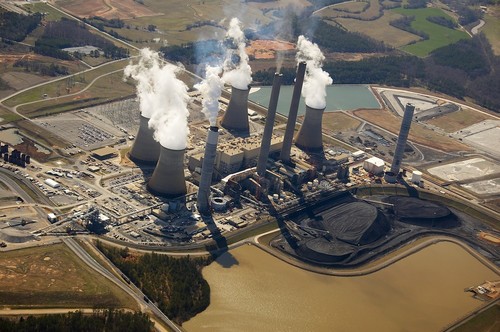 The good news: because utilities such as Southern Company are switching away from coal U.S. emissions of CO2 are the lowest they’ve been in 20 years. The bad news: they’re switching to natural gas, which not only still emits carbon dioxide, it pollutes groundwater through fracking, requires a lot of groundwater to do the fracking in the first place, and then uses more groundwater for cooling. But the further good news is cheaper energy sources drive out expensive ones, and wind and solar are already cheaper than nuclear
and coal, and solar is already cheaper than natural gas. Oh, and solar and wind emit no CO2.
The good news: because utilities such as Southern Company are switching away from coal U.S. emissions of CO2 are the lowest they’ve been in 20 years. The bad news: they’re switching to natural gas, which not only still emits carbon dioxide, it pollutes groundwater through fracking, requires a lot of groundwater to do the fracking in the first place, and then uses more groundwater for cooling. But the further good news is cheaper energy sources drive out expensive ones, and wind and solar are already cheaper than nuclear
and coal, and solar is already cheaper than natural gas. Oh, and solar and wind emit no CO2.
Kevin Begos write for AP yesterday, AP IMPACT: CO2 emissions in US drop to 20-year low
“There’s a very clear lesson here. What it shows is that if you make a cleaner energy source cheaper, you will displace dirtier sources,” said Roger Pielke Jr., a climate expert at the University of Colorado.
While conservation efforts, the lagging economy and greater use of renewable energy are factors in the CO2 decline, the drop-off is due mainly to low-priced natural gas, the agency said.
A frenzy of shale gas drilling in the Northeast’s Marcellus Shale and in Texas, Arkansas and Louisiana has caused the wholesale price of natural gas to plummet from $7 or $8 per unit to about $3 over the past four years, making it cheaper to burn than coal for a given amount of energy produced. As a result, utilities are relying more than ever on gas-fired generating plants.
Both government and industry experts said the biggest surprise is how quickly the electric industry turned away from coal. In 2005, coal was used to produce about half of all the electricity generated in the U.S. The Energy Information Agency said that fell to 34 percent in March, the lowest level since it began keeping records nearly 40 years ago.
And that’s why Southern Company (SO) turned towards natural gas:  it’s cheaper! SO still prefers nuclear and coal before gas, as SO CEO Thomas A. Fanning keeps reminding us. But even SO couldn’t ignore “the revolution in shale gas”, which is cheaper prices through fracking. Solar PV costs dropped 50% last year alone. How long can SO ignore that?
it’s cheaper! SO still prefers nuclear and coal before gas, as SO CEO Thomas A. Fanning keeps reminding us. But even SO couldn’t ignore “the revolution in shale gas”, which is cheaper prices through fracking. Solar PV costs dropped 50% last year alone. How long can SO ignore that?
“Natural gas is not a long-term solution to the CO2 problem,” Pielke warned….
Continue reading →
The Georgia Public Service Commission (PSC) today in a 5-0 vote approved Georgia Power’s spending on Plant Vogtle units 3 and 4 for the period including July 1, 2011 through Dec. 31, 2011.




 for
for 













